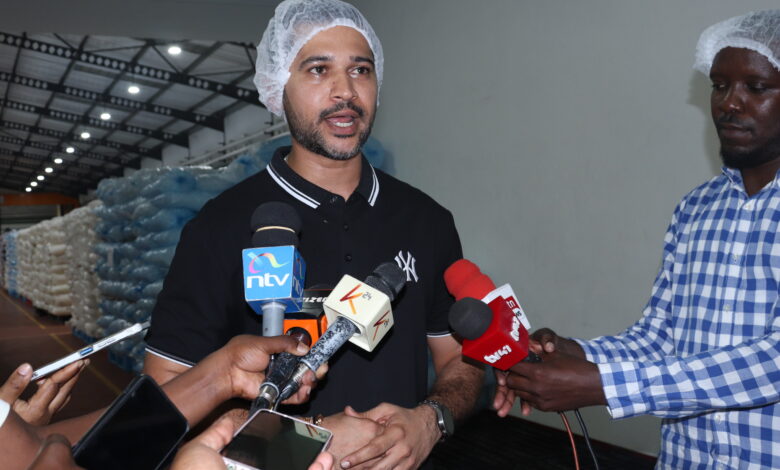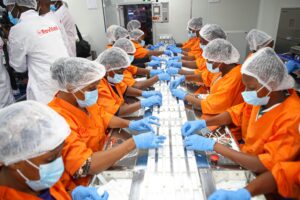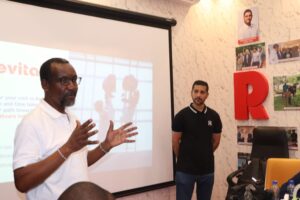Inside Kenya’s Factory Injecting the World with Syringes
Revital to launch its Rapid Antigen Test Kits following WHO's declaration of Mpox as a global health emergency

Mombasa. When I hear the word “syringe,” a swirl of emotions sweeps over me—a mix of nervous anticipation for the pain of an injection and deep trust in its healing power. It’s a symbol of medical intervention, evoking both relief and anxiety. This feeling mirrored my experience last Saturday, August 17, as we boarded a minibus in Mombasa, joined by over 20 local journalists.
We were setting out on a journey deep into the heart of a remarkable tale—one of Africa’s true success stories. The 28-kilometer drive, Northeast, lasting just over an hour, was filled with lively conversation and shared laughter as we traveled through the coastal scenery.
As we approached our destination, the anticipation grew, for we were about to step into Africa’s shining example of medical manufacturing excellence.
Welcoming us into Revital Healthcare’s boardroom, my attention was instantly drawn to the walls, adorned with a vibrant mosaic of photos of past events. These images were more than just a showcase of success and achievements captured through the camera lens; they narrated a story of Kenya’s innovation and capability to produce home-grown medical supplies.
The room, bathed in a warm, inviting glow, radiated remarkable ambition. It was not just a meeting space; it was a window into a legacy of innovation and transformative growth.
Nestled in the heart of Kilifi County, on the serene coastal stretch of Kenya, lies a manufacturing giant, Revital Healthcare EPZ Limited that is quietly reshaping Africa’s medical industry.
What began 16 years ago as a modest family-run business in Jomvu Miritini, Mombasa, has transformed Revital Healthcare into more than just a medical equipment manufacturing facility; it’s now a center of innovation and resilience.
In a region traditionally reliant on imports, Revital has emerged as a trailblazer, proving that Africa can—and must—achieve self-reliance. Since establishing its second manufacturing plant in 2017 in Kilifi, the company has rapidly expanded, becoming one of the largest manufacturers of medical devices, exporting to over 50 countries across Africa and beyond.
Among its key medical products include auto-disabled syringes, needles, rapid diagnostic test kits for HIV, malaria, pregnancy, and STDs; Personal Protective Equipment sets; neonatal care equipment; transfusion equipment; and blood collection tubes, and tubing.
Entering Revital Healthcare’s industrial facility, I was pleasantly struck by the meticulous cleanliness and the attention to detail. Before stepping into the heart of the operation, we were outfitted with protective shoes and head wraps, a routine process that we were reminded is part of their commitment to hygiene and safety.
The tour unfolded with a fascinating walkthrough of their syringe manufacturing process, from the two-piece syringes, including the plunger and barrel, to the more complex three-piece versions with plunger, barrel, and gasket—though the latter sees limited use in Kenya.
We observed various machines, each calibrated with distinct mold settings to produce precise components. The quality control room was a hive of activity, ensuring every kit met stringent effectiveness standards.
In another section, the air was filled with a distinctive, methylated spirit-like scent as equipment underwent rigorous sterilization. While the needles are imported, we were informed that their synchronization and manual assembly occur seamlessly on-site.
A universal testing machine assessed the strength of the assembled components, with each one needing to meet a minimum threshold of 34 newtons [In simple terms this is the amount of pressure or force needed to push the plunger of the syringe to inject or draw fluid]. The entire experience highlighted Revital Healthcare’s dedication to quality and innovation in medical manufacturing.
During the COVID-19 pandemic, when the world grappled with unprecedented challenges, Revital Healthcare played a crucial role. The company exported over 70 million COVID-19 vaccine syringes, becoming a cornerstone in the global fight against the virus.
“Before COVID-19, we never thought of local manufacturing of medical equipment,” reflects Roneek Vora, the Director of Sales and Marketing at Revital. “As Africa, we need to unite and equip ourselves faster and better. We need to support local manufacturing.”
The pandemic, while devastating, acted as a catalyst for change. As the world shut down, demand for medical supplies surged. Instead of downsizing, Revital ramped up production, increasing its workforce to meet the soaring demand.
Today, the facility produces an impressive 300 million syringes annually, supplying countries as far as India. But it’s not just about numbers; it’s about quality and accessibility.
“We are about quality, affordability, and to ensure accessibility of critical test kits to people,” Roneek told curious journalists during the one-day tour organized by Kenya Editors’ Guild under a Project dubbed Thought Leadership Series.
Revital’s commitment to innovation and safety is unparalleled. The company became the first in Africa to receive the World Health Organization (WHO) Prequalification for its auto-disable (AD) syringe, achieving this milestone in 2009 – just a year after its launch as one of only seven companies worldwide to do so.
These syringes are designed for mass immunization programs and are locked after a single use, effectively preventing reuse and reducing the risk of infections from contaminated needles. It’s a small innovation with a huge impact, ensuring safe vaccinations across the continent.
The facility’s contributions go beyond syringes. In response to the recent Mpox outbreak, declared a global public health emergency by WHO, Revital is gearing up to launch its own Rapid Antigen Test Kits for Mpox.
“Very soon, Revital will be launching its very own Rapid Antigen Test Kits for Mpox,” Roneek revealed.
The company’s agility in responding to public health crises is a testament to its forward-thinking approach. Additionally, Revital has established an internship program for medical students from universities like Pwani University, offering hands-on training in their state-of-the-art labs – thus equipping future medical practitioners.
At the heart of Revital’s success is its people. The facility employs 750 individuals, with 80% being women and 99% Kenyan. It’s a place where diversity thrives, including opportunities for persons with disabilities, such as the deaf, who play a crucial role in manually assembling syringe components.
But Revital’s vision extends beyond its immediate operations. The company is in the process of constructing Africa’s largest healthcare kits assembly facility at Dongo Kundu, Special Economic Zone (SEZ).
“We need to change our mindset on consuming locally manufactured goods. It brings down costs; the more affordable the products, the more people can buy them, and the more we can treat,” said Roneek.
Revital Healthcare’s journey is a powerful reminder of what is possible when innovation meets determination. As the company continues to expand and evolve, it is not just transforming the medical manufacturing sector but also inspiring a continent to believe in its potential.

Africa must become self-reliant and self-sufficient by building home-grown capacity that allows the continent to handle its own needs. The narrative needs to be rewritten to reflect the story of a changing and advancing Africa.
As Ken Bosire, a Program Officer at Kenya Editors’ Guild aptly puts it, “There is a need to showcase Kenya’s potential in the manufacturing sector and exports.”
In a world where reliance on imports has been the norm, Revital Healthcare is a shining example of how local manufacturing can bring down costs, improve accessibility, and ultimately, save lives.
The future of Africa’s healthcare is being built in places like Kilifi, and it’s a future where the continent stands tall and self-reliant.
Leaving Revital Healthcare, we were struck by a profound sense of possibility. The facility embodied African innovation at its finest, where passion and precision converged to shape the future of global healthcare. The spirit of resilience and ambition lingered with us, a powerful reminder that this was more than just a company—it was an inspiration of what Africa can achieve.
Very inspiring article of Africa’s abilities